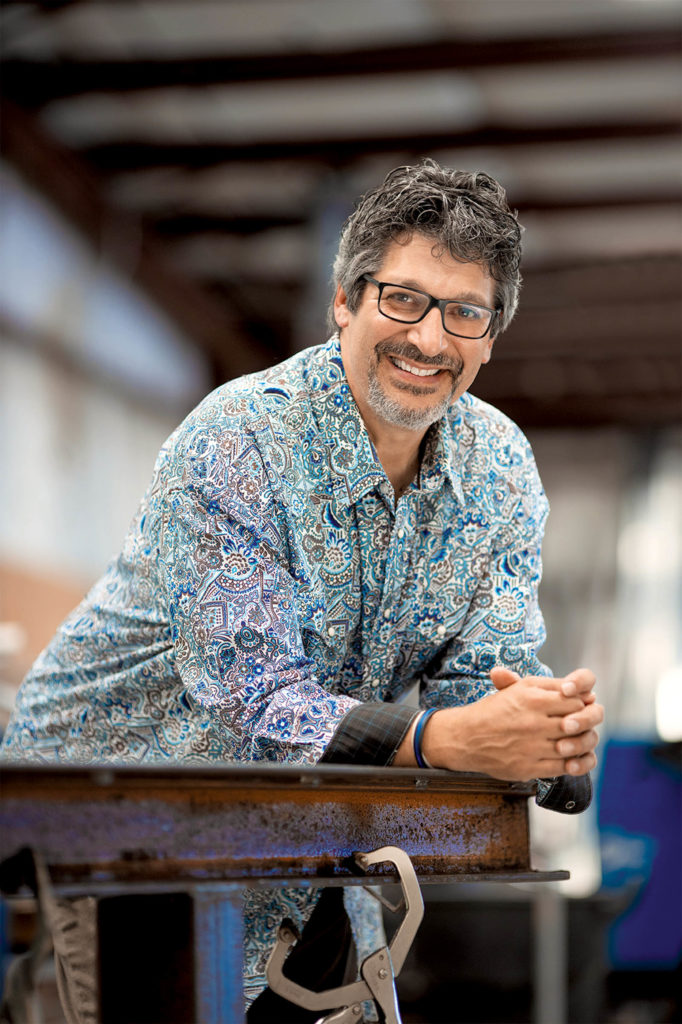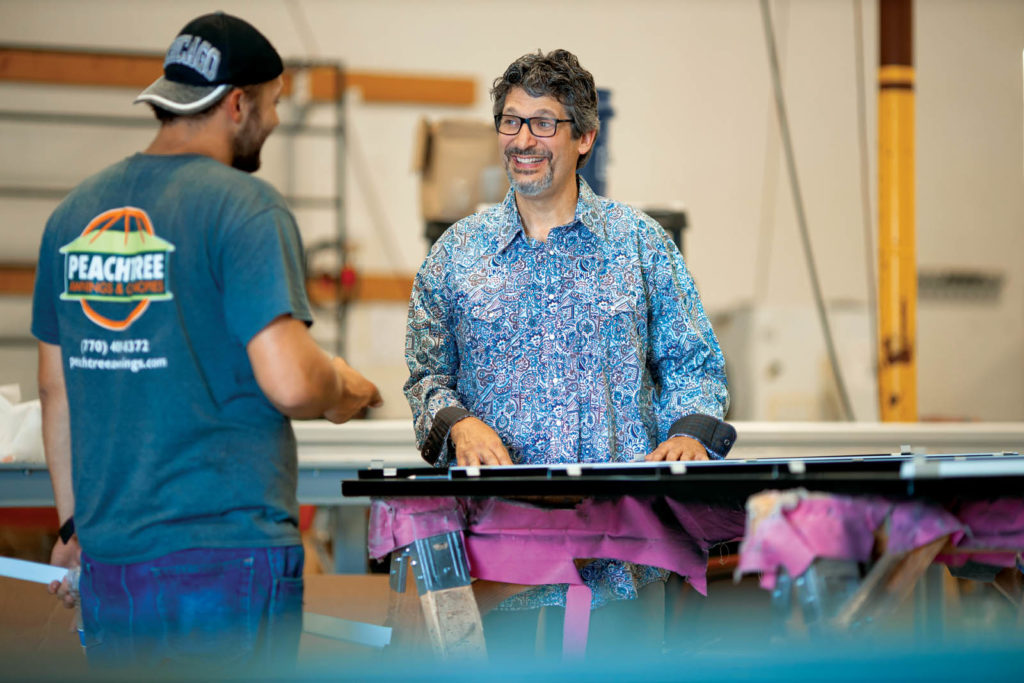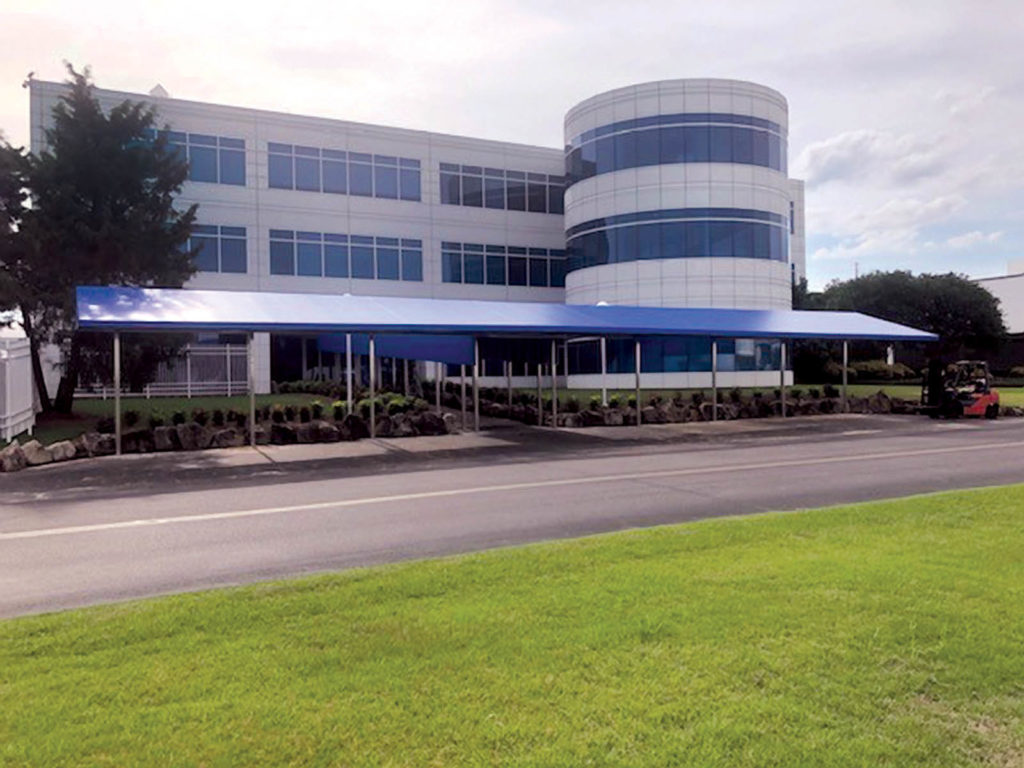by Jill C. Lafferty

“You have to be an exceptional artist. You’ve got to be able to create a vision for your customer,” says Barry Adams, owner of Peachtree Awnings in Norcross, Ga., and Tennessee Awnings in La Vergne, Tenn. “Where the customer lacks vision, we have to give them a vision about what we can do for them and what they want. It’s almost like being an architect. When we finish, and the customer says that it’s even better than they thought it would be—I love hearing that.”
Adams’s passion for the awning business has come a long way in 15 years. In 2005, Adams was looking to start a business in the Atlanta metropolitan area, after working for a closely held family company for 18 years and attaining his MBA at Kennesaw State University. With an undergraduate degree in engineering, he thought about staking his entrepreneurial claim in the sign industry, but he wanted something a little more differentiated. That’s when a business consultant he was working with brought up awnings.
“I kind of wrinkled up my nose and said, ‘Really? Is that what you are going to pitch?’” Adams says. The consultant explained that there were only six competitors in all of Atlanta, one of the fastest growing metropolitan regions in the United States. That fact piqued Adams’s interest, and after some due diligence, he opened what is now known as Peachtree Awnings with two employees (one welder, one sewer), no customers, no orders and having never made an awning before. He did buy into a North Carolina-based franchise, which provided basic training in fixed-frame and stationary-frame awnings and recommended equipment purchases for the shop. From there, he set out to sell mostly residential window and door awnings.
“If I came back to the office with orders, I was ecstatic—I was beside myself happy,” he says. “I think back on that, and it makes me realize how far we’ve come since starting the business from inception. I did not have a business that was handed over to me by the previous generation. I started it from scratch. That part of it has been very rewarding because of what I’ve been able to accomplish with the team I’ve put together over those 15 years.”
A new identity
Three years into the franchise agreement, Adams terminated the relationship through the business equivalent of a divorce and a de-identification process that required renaming the company.
“When I was brainstorming different names, I was surprised to discover that in Atlanta, ‘Peachtree Awnings’ had never been used,” he says. “Well, that’s a name that sounds like it’s been around for a long, long time, and my thinking was that I want to sound like I’ve been in business for a long time. We became Peachtree Awnings in 2008.”
A few years later, the owners of another former franchisee company reached out to Adams about the possibility of selling their Nashville/middle Tennessee-based business to him. Adams had been interested in moving into another market, and the vibrant and fast-growing Nashville area, a 3½-hour drive from Atlanta, was the perfect opportunity.
“So now, we are two locations serving two nice, thriving, southeastern metropolitan areas,” Adams says. “We’ve been able to build our business with that as a platform.”
Adams’s selling strategy is to focus on selling a solution, rather than a product. “We try to be solution sellers,” he says. “When we go into a sales situation, we look at the problem the customer is trying to solve. If you solve their problem, then you will most definitely have a satisfied customer.”
As both locations have grown, Adams’s customer base has shifted from consumers to general contractors, property managers and business owners, and his role has shifted from operator, to owner-operator, to owner.
“If you want to function more like an owner, you have to work on your business rather than in your business,” he says. “Today, I find myself working more on my business than in my business, although I’m still a producer within my company. I don’t install anymore, but I still sell projects. The entrepreneurial spirit lives within me. I’m a Renaissance man and I like to have my hands in lots of different things.”

A scientific approach
Through all of his work experiences, Adams says he’s developed a talent for recruiting and selecting good employees—or associates, as they are called in his businesses. Peachtree Awnings employs up to 17 associates seasonally, and Tennessee Awnings up to 10 seasonally. Having competent general management at the helm is especially important for a multisite business.
“That means I can leave Atlanta and work in Nashville for two or three days at a time and know that we are still selling and building and installing awnings in Atlanta. And likewise, when I’m sitting here in Atlanta, I can’t be wondering if the guys in Tennessee are doing the right thing every day.”
The key to being successful in a small business is finding people who can be as passionate about your business as you are, he says. He admits that’s easier said than done.
“You can say that, but then you have to go out and execute that,” he says. “You have to have a big net to bring in prospective associates. You have to have a process that vets those people through a series of interviews and data points, as I call them, that funnels them through and produces fairly consistent and predictable results. It’s not an exact science, but you are trying to make it somewhat or more scientific. You are trying to take the variation out of it. That part of it is not easy.”
The scientific approach to building a competent, reliable and passionate team doesn’t end when a new associate is on board, either.
“When somebody leaves, you have to ask: Why did that not work out? Why did that person leave our company? Were they never engaged in the company’s mission? Was it a failure of leadership? Did they not get trained properly or never get connected? Or maybe it was not anybody’s fault. Maybe they just had a better opportunity somewhere else.”
Forging ahead
Fifteen years after wrinkling his nose at the idea of an awning business, Adams chairs the board of the Professional Awning Manufacturers Association (PAMA) of IFAI. But he still sometimes feels like a neophyte in the industry.
“My peer group is families that have been in the awning business for generations, and here I am for 15 years,” he says. “It’s a substantial length of time in my life and business career, but I’m frequently surrounded by people who are much more tenured and seasoned.”
While his locations may be relatively young in the awning world, Adams has faced the ups and downs of business cycles. Seeing his way through the Great Recession is one of his proudest accomplishments.
“When the financial markets collapsed [in 2008], it was a very uncertain time,” he says. “I continued to be optimistic. I didn’t lay anybody off; I didn’t pull back. I kept investing in my business—methodically, not recklessly. I think while other people were pulling back, we were forging ahead, and so I’m proud of that period.”
Because of their association with the construction industry, Adams’s businesses were deemed essential during the COVID-19 pandemic. He describes the early weeks of the crisis as a bit like directing a play with actors coming on and off stage. Installers would leave the facilities before other associates would arrive, and those who could work remotely were allowed to do so.
“Being a small business owner, you just never know what you are going to come up against in a day or week or month,” he says. “Especially right now, it’s like walking through a field of land mines just to keep open. You’ve got to be super agile, very creative, thoughtful and deliberate with how you are structuring your workforce and looking out for your people, not putting them in harm’s way, and allowing people the opportunity to work remotely where possible. You have to trust that people are doing the right thing—and if you selected the right people, they are out there doing the right thing.”
Jill C. Lafferty is senior editor of Specialty Fabrics Review.
SIDEBAR: Snapshot

Inviting entrance
For Peachtree Awnings, becoming the preferred supplier of awnings and canopies for Hyundai Motor Manufacturing (HMM) in Montgomery, Ala., was a sign of recognition for the quality and service the Norcross, Ga.-based awning manufacturer provides. In 2019, Peachtree designed, manufactured and installed a “porte cochère” on the factory campus that utilized a sleek, tight, engineered look while being lightweight and incorporating “Hyundai Blue” in the finished product. The cantilevered design checked all the boxes for the HMM design group. The structure utilizes Serge Ferrari Soltis Proof 502 satin fabric, with stainless steel posts adding a finishing touch. “The plant receives thousands of visitors every year, from foreign dignitaries to some of the world’s best and brightest engineers,” says Barry Adams, owner of Peachtree Awnings. “The entrance canopy literally ‘reaches out’ and invites people into the building when they arrive on the main campus.”
SIDEBAR: Q&A
What do you love about your work?
I like to say that we spend a third of our time as manufacturers, a third in construction and a third as artists. That’s the great thing about the awning business: it’s equal parts manufacturing, being a field tradesperson like a brick mason or electrician, and being an artist, because we get to be incredibly creative about the work we produce. No two projects are alike. We get to create something that is really custom and fits the customers’ needs. I love all three aspects of the business. I love the science of being the field tradesperson. That fell out of vogue somewhere along the line—it became not real cool to be a tradesperson, but right now in particular, the tradespeople are the people who are still working. I love being a manufacturer and I love the science of what goes on in our shop. And I love the creative ability to be an artist every day.
 TEXTILES.ORG
TEXTILES.ORG


